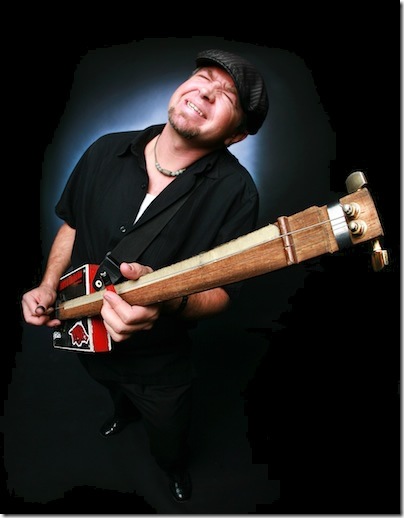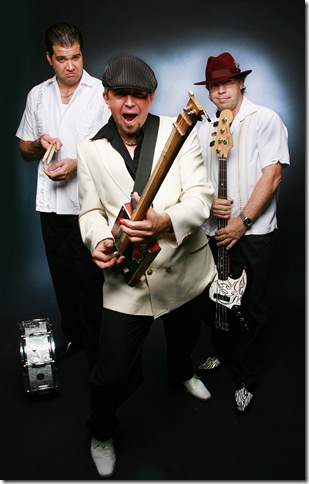For centuries, blues has been one of the few musical genres to succeed through purposeful simplicity, grit, and an innate sense of Southern musical feel.
Ironically, one of the artists on the leading edge of new blues, singing South Florida guitarist JP Soars (www.jpsoars.com), resides among the shopping centers and pink office buildings of the decidedly non-bluesy Boca Raton.
“I’ve lived in Boca since 1999,” says the 44-year-old Soars, who was born in Anaheim, Calif. (as John Paul Soars), and moved to Arkansas with his family at age 3. “We moved to West Palm Beach in 1985, when I was 16, and it was a culture shock. I’d come from a town of farmers with no traffic lights. But South Florida turned out to be where I got bitten by the blues bug.”
The biggest blues star of the 20th century was likely Robert Johnson, who used three chords on an acoustic guitar, often played with a slide, and sang haunting vocals about demons and devils. Sadly, that stardom didn’t come until the mid-1960s, when British rock bands latched onto the folklore that had followed Johnson’s unsolved 1938 murder at age 27.
Fellow Mississippian B.B. King, still touring at age 87, steadily expanded the Delta blueprint by adding drums, bass, keyboards, horns and backing vocals to gradually become the biggest blues star in the world, but others have stretched the genre’s edges further.
Artists like transplanted singing Chicago guitarists Muddy Waters and Buddy Guy helped to electrify the blues in the 1950s; two guitarists from among the mythical three Kings ― Albert and Freddie ― were Texans, and the Lone Star State then blurred the line between blues and rock through the work of native sons like Johnny Winter during the ’70s and the Vaughan brothers (Jimmie and Stevie Ray) in the ’80s.
Blues had not-so-quietly gone electric without the backlash that Bob Dylan would face by plugging in at the Newport Folk Festival in 1965, and has survived into the modern era more through inclusion than exclusion.
Soars came to the blues from one of the most unlikely sources ― loud, fast metallic rock with successful South Florida bands Raped Ape, Paingod, and Divine Empire.
“That period was between 1989 and 1996,” Soars says. “Raped Ape was turned down by interested labels because of our name, so we changed it to Paingod. We released four or five albums on cassette between the two names, and then recorded our CD, ‘Terminal Reality,’ for a small label. And Divine Empire toured to Canada and Europe. After that, I decided to start going to blues clubs and jams and sitting in, and got hooked.”
Modern blues, from the one-chord vamps of Colorado-based Otis Taylor to soulful California native Keb’ Mo’; the intense vocals and playing of Northeastern native Susan Tedeschi to the finger-picking wizardry of her husband, Floridian Derek Trucks, and the contrasting distorted guitar and smooth vocals of Austin-born Gary Clark Jr. to the hollow-bodied and homemade guitar pyrotechnics of Soars, are now decidedly influenced by outside sources.
So by playing metal, Soars unwittingly helped to shape his signature future blues style. He does, after all, list influences on his website that include Waters, Wes Montgomery, Black Sabbath, Tito Puente, Guitar Slim, Hank Williams, and Slayer.
“When I first heard JP Soars,” says Jimmy Thackery, touring guitarist and founding member of Washington, D.C. blues road warriors The Nighthawks, “I knew right away that he was separate from the rest of the pack.”
Dexterity helps, and few guitarists have as much of it as Soars. In addition to playing metal, he currently covers the intensely-challenging swing material of iconic World War II-era guitarist Django Reinhardt in his Gypsy jazz solo and duo performances.
“That project used to involve a bigger band,” Soars says, “but it’s hard enough to even find another guitarist to play that stuff with. I play an acoustic guitar that’s a copy of the one Django played, and you have to order the special ‘Gypsy jazz’ strings for it off the Internet. Three of them in the set are steel, and the other three are a hybrid of steel and nylon.”
Rock and blues have practically become a permanent hybrid since the late Stevie Ray Vaughan combined them to become a most unusual star in the mid-1980s. It was the dawning of the style-over-substance music video era, and one of its veteran stars was chameleonic British pop singer David Bowie, who often used searing lead guitarists (Peter Frampton, Adrian Belew, Reeves Gabrels) for albums and tours. He tapped Vaughan for his 1983 LP Let’s Dance, and the guitarist’s stinging, updated Albert King blues solos stood out among pop hits (and videos) like Modern Love and China Girl.
Vaughan eschewed a tour with Bowie to start his solo recording career, and included his strong Jimi Hendrix influence (even covering his tunes Voodoo Child and Third Stone From the Sun) to equal the late rocker’s comet-like career in blues. Like Hendrix, Vaughan had the advanced technique, balanced with impeccable blues/rock feel, that often leads guitarists into jazz/fusion (see Jeff Beck). And like Hendrix, Vaughan had his alcohol and substance demons. Ironically, he was clean and sober when he died in a post-concert helicopter crash in 1990 at age 35.
“Stevie was amazing playing Fender Stratocasters,” Soars says. “I still have the Charvel and Jackson solid-body guitars I used in the metal bands, but now I play a hollow-body Epiphone and a two-string cigar box instrument that I made with my brother to play slide guitar on.”
Soars took a long blues apprenticeship ― learning how not to be among the legion of Vaughan wannabes — for more than a decade before recording his 2008 debut blues CD Back of My Mind. He also spent that time wisely cultivating his long-standing Red Hots trio with drummer Chris Peet and bassist Don Gottlieb.
Native Floridian Peet hails from a musical family (his uncle is incendiary local guitarist Steve Siciliano), and subbed in area bands from country act Straight Shooter to roots rock trio The Dillengers before playing for most of the 2000s with 301 East, the house band at Elwood’s in Delray Beach. Native New Yorker Gottlieb often sat in and subbed at that popular barbecue joint along Atlantic Avenue, both with The Dillengers and 301 East, so he and Peet developed a rhythmic dialog along the way.
“Chris and I have been playing together since around 2005,” Soars says, “and Don for almost that long. We’ve all really developed a chemistry and tightness. They know where I’m going and vice versa. It’s comforting to have that, and it’s what makes a real band.”
In 2009, JP Soars and the Red Hots won the regional International Blues Challenge, which sent them to Memphis, Tenn., for the finals. They won there also, with Soars additionally taking home the coveted Albert King Award as most promising guitarist. The 29th installment of the IBC runs from Jan. 29-Feb. 2 in Memphis.
“You’re not allowed to win it twice,” Soars says. “But it was great to win, experience Beale Street, and visit places like the Stax Records Museum.”
Rather than coast on the wave of its success, Soars’ trio went back into the studio as if to earn such accolades. The fiery resulting 2011 CD, More Bees With Honey, proved one of the best-ever independent releases by a South Florida artist.
The trio’s staggered accents start the CD’s opening title track by exploding from the speakers, and rare blues unpredictability is the rule on feels ranging from the funky Doggin’ to slow-grinding Lost It All. That rule especially applies to the bipolar blues of Hot Little Woman, on which the trio effortlessly shifts between relaxed shuffle
and double-time jump feels.
A 2012 independent release by Thackery proved that the veteran guitarist wasn’t just paying lip service. As Live As It Gets, by Jimmy Thackery and The Drivers featuring JP Soars, finds the 59-year-old guitarist paying it forward by spotlighting his special guest, who’s 15 years his junior.
“That was recorded during the Pacific version of the 2011 Legendary Rhythm and Blues Cruise,” Soars says. “Jimmy traded solos with me all through those shows, and I think he even let me sing more songs than he did. He’s helped me a lot.”
Playing in metal bands additionally helped Soars gain experience with record labels and international touring, both of which are coming in handy now.
“We’re working on the next Red Hots CD,” he says, “and I like the idea of releasing it independently again. We’ve been approached by some small labels, but by doing it yourself, you remain in control. You don’t have to depend on someone else to further your career. I’ve had more success and sales with our two independent records that I’ve ever had on a label, but if the right one came along with the right deal, I’d consider it.”
He may have that opportunity soon, since his next release is the March 2013 CD by the collective Southern Hospitality on Blind Pig Records. Produced by New Orleans-based international touring artist Tab Benoit, the project also features notable regional blues draws in Bradenton vocalist, guitarist and lap-steel master Damon Fowler and Memphis keyboardist and singer Victor Wainwright. The quintet is rounded out by Peet and Fowler’s bassist, Chuck Riley, and will tour the United States and Europe this year.
“It’s been great,” Peet said, “a lot different from the sparseness of the three-piece Red Hots. With two guitars and Victor playing organ, we’re getting a really full sound.”
That sound was recently featured on the Caribbean version of the Legendary Rhythm and Blues Cruise, with artists like Taylor, Benoit, Taj Mahal, Elvin Bishop, The Lee Boys, Debbie Davies, Mavis Staples, and Big Head Todd and the Monsters.
With such company and traveling, it’s hard to imagine a rising talent like Soars playing as much in South Florida through 2013 as he will in February (see below).
“We’re just trying to keep it rolling,” he says, “keep up the momentum. Chris, Don and myself just did our first European tour last December, playing in Belgium, France, Germany and Holland. And it was very successful, so we’ll probably go back in 2014. Damon, Victor and I all signed an agreement with Blind Pig that we wouldn’t release any solo material for six months after the ‘Southern Hospitality’ release.
“So that’ll give us time to finish up the next Red Hots CD, and it’ll be a good test of what it’s like to be on a label now as opposed to the ’90s, since a lot has changed since then.”
See JP Soars and the Red Hots at 9 p.m. on Feb. 2 at the Bamboo Room, 25 S. J St., Lake Worth (561-585-2583); 8:30 p.m. on Feb. 5 at Boston’s On the Beach, 40 S. Ocean Blvd., Delray Beach (561-278-3364); 7 p.m. on Feb. 7 at South Shores Tavern, 502 Lucerne Ave., Lake Worth (561-547-7656); 7 p.m. on Feb. 10 at Fish Tales, 3355 NE 33rd St., Fort Lauderdale (954-689-2344); 8 p.m. on Feb. 12 at Mardi Gras Casino, 831 N. Federal Highway, Hallandale Beach (954-924-3200); 8 p.m. on Feb. 15 at Nick and Johnnie’s, 207 Royal Poinciana Way, Palm Beach (561-655-3319); 3 p.m. on Feb. 16 at Guanabana’s, 960 N. Highway A1A, Jupiter (561-747-8878); 8 p.m. on Feb. 16 at The Backyard, 511 NE 4th St., Boynton Beach (561-740-0399); 8 p.m. on Feb. 21 at the Pavilion Grille, 301 Yamato Road, Boca Raton (561-912-0000); and 9:30 p.m. on Feb. 23 at The Funky Biscuit, 303 SE Mizner Blvd., Boca Raton (561-395-2929).

